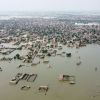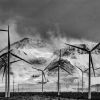-
 +26 +1
+26 +1This Startup Is Making Ultra-Strong Building Panels Out of Grass
Construction is a major carbon emitter. The manufacture of cement alone accounts for eight percent of the world’s emissions. But humanity certainly isn’t about to stop building things—in fact, fixing the housing shortage should be near the top of our list of problems to solve. So we need to find more sustainable ways to build, and if they can be cheaper to boot, even better.
-
 +14 +1
+14 +1Study Shows How Corporations Are Deceiving the Public to 'Greenwash Their Brand'
A detailed study published Monday finds that the climate pledges of some of the world's largest companies are often highly misleading, lack transparency, and fall well short of what's necessary to avert catastrophic warming.
-
 +16 +1
+16 +1Bill Gates just invested in a startup that's trying to stop cows from burping and farting so much
What do a billionaire philanthropist, a climate tech firm, and fewer cow burps have in common? Just ask Bill Gates, whose investment firm Breakthrough Energy Ventures, or BEV, led a $12 million seed funding round into an Australian climate tech firm working to reduce methane emissions — like those from cows.
-
 +19 +1
+19 +1Instead of Building Structures on Mars, we Could Grow Them With the Help of Bacteria
Since the 1990s, several architectures have been drafted for crewed missions to Mars, all of which have emphasized the need for keeping launch mass low. Suggestions for how this could be accomplished include inflatable modules. But as Dr. Jin emphasized in her proposal, the physical structures used to outfit the inflatable modules cannot be carried by a crewed spacecraft and generally require a second vehicle to launch them. This is a logistical challenge for missions and drastically increases launch costs.
-
 +20 +1
+20 +1'This Insanity Belongs in Science Fiction': At Davos, UN Chief Rips Fossil Fuel Expansion
United Nations Secretary-General António Guterres delivered a scathing address to corporate and political elites in Davos on Wednesday, ripping fossil fuel giants and governments for expanding oil and gas extraction in the face of increasingly devastating climate chaos across the globe.
-
 +11 +1
+11 +1A climate fund was born. It still doesn't have any money.
Two months after officials from around the world reached a surprise agreement to provide aid for escalating climate damages, the new fund hasn’t received a single pledge. The fund, created to help poor nations grapple with unstoppable climate dangers, like rising seas, was seen as a major victory at the global climate talks in Egypt late last year. The absence of any financial commitments since then is raising concerns in developing countries that the fund could fail to deliver the historic help that was promised by world leaders.
-
 +14 +1
+14 +1Compound extreme heat and drought will hit 90% of world population
More than 90% of the world's population is projected to face increased risks from the compound impacts of extreme heat and drought, potentially widening social inequalities as well as undermining the natural world's ability to reduce CO2 emissions in the atmosphere—according to a study from Oxford's School of Geography.
-
 +13 +1
+13 +1New York City's greenery absorbs a surprising amount of its carbon emissions
A study of vegetation across New York City and some densely populated adjoining areas has found that on many summer days, photosynthesis by trees and grasses absorbs all the carbon emissions produced by cars, trucks and buses, and then some. The surprising result, based on new hyper-local vegetation maps, points to the underappreciated importance of urban greenery in the carbon cycle. The study is published in the journal Environmental Research Letters.
-
 +18 +1
+18 +1The promise of batteries that come from trees
As demand for electric vehicles soars, scientists are searching for materials to make sustainable batteries. Lignin, from waste paper pulp, is shaping up to be a strong contender.
-
 +15 +1
+15 +1The weird Republican turn against corporate social responsibility
Republicans have found a new front in the culture war. For months, Republicans have been attacking ESG, the financial shorthand for how some companies consider all the ways the environment, social issues, and corporate governance impact their bottom line. One of the GOP’s recent targets is BlackRock, the world’s largest asset manager, which oversees some $8 trillion in assets, as a symbol of the financial community’s growing recognition that climate change is too big to ignore.
-
 +4 +1
+4 +1Now is the time to impose carbon taxes across the global economy
Carbon taxes have been the subject of longstanding debate in policy and economic circles as the costs of climate change pile up. Simply put, carbon taxes impose charges on the carbon content of fossil-fuel supply. They can be integrated into road-fuel taxes—which are well established in more than 160 countries—and extended to coal, natural gas and other petroleum products.
-
 +14 +1
+14 +1Amazon workers strike in the US and 30 other countries on Black Friday in global 'Make Amazon Pay' campaign
Black Friday kicks off the holiday shopping season. For Amazon, it's already off to a rocky start. Today, Amazon workers and activists are protesting to secure better working conditions across the globe. The campaign is led by Make Amazon Pay, a coalition of 70 trade unions and organizations including Greenpeace, Oxfam, and Amazon Workers International.
-
 +22 +1
+22 +1Consider making less food and composting leftovers this Thanksgiving, experts say
Environmentalists urge people to think twice about how much food they make and how to deal with leftovers this Thanksgiving. New York City, reportedly the world's most wasteful city, last year produced 5% more trash the week after Thanksgiving than during a typical week, according to the city's Department of Sanitation.
-
 +12 +1
+12 +1Western Farmers Are Strapped for Water. These Technologies May Help.
Amid a historic drought and a rising population, new devices and approaches can help ease the strain on water resources for agriculture.
-
 +17 +1
+17 +1Historic compensation fund approved at U.N. climate talks in Egypt
In a historic first, countries have agreed to set up a fund to help pay for the devastating impact of climate change on poorer nations, according to a deal unveiled on Sunday after marathon talks. “It is clearly a down payment on the longer investment in our joint futures,” said Sherry Rehman, environment minister of the flood-hit Pakistan.
-
 +22 +1
+22 +1The Human Cost Of Moving Away From Fossil Fuels
Millions of workers from developing countries have left their homes to work in the Gulf states, sending back money to support their families and communities. And every major decline in the price of oil comes with massive disruptions to those workers’ lives and the economies of their home countries.
-
 +3 +1
+3 +1Extreme Heat Will Change Us
Half the world could soon face dangerous heat. We measured the daily toll it is already taking. ON A TREELESS STREET under a blazing sun, Abbas Abdul Karim, a welder with 25 years experience, labors over a metal bench. Everyone who lives in Basra, Iraq, reckons with intense heat, but for Abbas it is unrelenting. He must do his work during daylight hours to see the iron he deftly bends into swirls for stair railings or welds into door frames.
-
 +15 +1
+15 +1Billionaires emit a million times more greenhouse gases than the average person: Oxfam
The investments of 125 billionaires produce 393 million metric tonnes of carbon dioxide emissions every year, according to a report by Oxfam. That’s the equivalent CO2 output to the whole of France and makes the average billionaire’s annual emissions a million times higher than a person in the poorest 90% of the world’s population, the global poverty charity says.
-
 +3 +1
+3 +1Famous glaciers will disappear by 2050 because of global warming, UNESCO says
Glaciers in Yosemite, Yellowstone, the Dolomites and Mount Kilimanjaro will melt by 2050. More will almost entirely disappear by 2100 unless the world drastically reduces carbon emissions, the agency says.
-
 +15 +1
+15 +1Beyond Catastrophe: A New Climate Reality Is Coming Into View
You can never really see the future, only imagine it, then try to make sense of the new world when it arrives. Just a few years ago, climate projections for this century looked quite apocalyptic, with most scientists warning that continuing “business as usual” would bring the world four or even five degrees Celsius of warming — a change disruptive enough to call forth not only predictions of food crises and heat stress...
Submit a link
Start a discussion




















